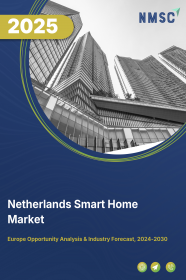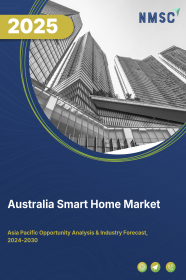
Netherlands Smart Home Market by Product Type (Smart Lighting, Smart Home Security & Surveillance, Smart Entertainment, and Smart Appliances), by Communication Protocol (Wi-Fi, Zigbee, Z-Wave, Bluetooth, and Thread), by Smart Home Hubs (Standalone Hubs and Built-in Hubs), by Voice Assistants Integration (Amazon Alexa, Google Assistant, Apple Siri, and Others) – Opportunity Analysis and Industry Forecast, 2024–2030
Industry: Retail and Consumer | Publish Date: 15-Feb-2025 | No of Pages: 140 | No. of Tables: 104 | No. of Figures: 69 | Format: PDF | Report Code : RC2278
US Tariff Impact on Netherlands Smart Home Market
Trump Tariffs Are Reshaping Global Business
Netherlands Smart Home Market Overview
The Netherlands Smart Home Market size was valued at USD 1.25 billion in 2023, and is predicted to reach USD 5.10 billion by 2030, at a CAGR of 22.3% from 2024 to 2030. A smart home, also referred to as a connected home, is a dwelling equipped with state-of-the-art technology and automation systems that allow for the centralized control and monitoring of a variety of household devices, appliances, and security features. These intelligent devices can be managed remotely and frequently respond to voice commands or present schedules, providing homeowners with increased convenience, energy efficiency, and security. Common components found in connected homes include smart thermostats, lighting systems, security cameras, voice assistants, and other interconnected devices aimed at enhancing the overall quality of life.
Higher Disposable Income Fostering Smart Home Adoption Fuels the Market Growth
In the Netherlands, the average household net-adjusted disposable income per capita exceeds the OECD average, reaching USD 34,984 annually. This elevated disposable income level among Dutch households creates a conducive environment for the adoption of advanced technologies and home automation solutions, including smart homes. Residents seek to elevate their living standards and streamline domestic tasks, driving the demand for innovative solutions. The robust economic situation in the Netherlands aligns with the growing trend of embracing automated household solutions, positioning the country as a promising market for connected homes and other connected home devices.
Growing Interest in Home Automation is Driving the Growth of the Market
The Netherlands experiences a growing inclination towards home automation and the adoption of connected home appliances, driving the expansion of the Netherlands smart home market trends. Notably, the Netherlands emerges as a European leader in connected home device usage, as reported by Statistics Netherlands (CBS).
With the increasing usage of smart devices, there is a corresponding rise in demand for connected homes in the Netherlands, offering convenient and time-saving solutions for maintaining an automated home environment. This surge in connected home adoption underscores the country's leadership in embracing innovative domestic technologies and positions the Netherlands as a promising market for connected home solutions.
Security and Data Privacy Acts as Barrier to the Netherlands Smart Home Market Growth
The smart home market faces a significant barrier to its growth due to concerns surrounding the security of interconnected systems. Devices such as thermostats, cameras, and door locks are susceptible to hacking, posing risks to residents' privacy and safety. Weak passwords or inadequate Wi-Fi network security measures often contribute to this vulnerability. Hackers exploit these weaknesses to gain unauthorized access, potentially compromising devices or accessing sensitive information.
To mitigate these risks, homeowners must prioritize strong password practices, regularly update device firmware, and strengthen home networks to reduce the threat of cyber-attacks and safeguard their connected homes from potential breaches.
Integration of Blockchain Technology into Smart Home Devices Presents Lucrative Opportunity for Market Expansion
The integration of blockchain technology into smart home devices offers a promising avenue for strengthening the security and privacy of connected home systems. Renowned for its robust security and transparent features, blockchain technology encrypts and securely stores sensitive connected home data, empowering users to control access permissions and minimizing the risk of unauthorized intrusion. By validating device identities, blockchain ensures that only trusted devices interact within the connected home network, while also automating tasks through tamper-proof smart contracts.
Furthermore, blockchain decentralizes device control, mitigating vulnerabilities and streamlining access control and permissions management. The incorporation of blockchain into smart homes not only enhances security and privacy but also fosters a safer and more confidential connected home environment. Consequently, it is poised to unlock significant growth opportunities for the market.
Competitive Landscape
Several market players operating in the Netherlands smart home industry include Honeywell International, Inc., Schneider Electric, ABB Ltd, Amazon, Gira, Samsung, LG Electronics, Loxone Electronics GmbH, eQ-3, D-Link Systems, Inc.
Netherlands Smart Home Market Key Segments
By Product Type
-
Smart Lighting
-
Smart Bulbs
-
Smart Light Strips
-
Smart Switches
-
-
Smart Home Security and Surveillance
-
Smart Cameras
-
Video Doorbells
-
Smart Locks
-
Security System
-
-
Smart Entertainment
-
Smart TVs
-
Smart Speakers
-
Streaming Devices
-
-
Smart Appliances
-
Smart Refrigerators
-
Smart Ovens
-
Smart Washing Machines
-
Smart Dishwashers
-
Smart Home HVAC Management
-
Other Smart Appliances
-
By Communication Protocol
-
Wi-Fi
-
Zigbee
-
Z-wave
-
Bluetooth
-
Thread
By Smart Home Hubs
-
Standalone Hubs
-
Built-in Hubs
By Voice Assistants Integration
-
Amazon Alexa
-
Google Assistant
-
Apple Siri
-
Others
By Smart Home Compatibility with Smartphones
-
iOS
-
Android
By Installation
-
DIY Installation
-
Professional Installation
By Sales Channel
-
Online Retailers
-
Retailers
REPORT SCOPE AND SEGMENTATION:
|
Parameters |
Details |
|
Market Size in 2023 |
USD 1.25 Billion |
|
Revenue Forecast in 2030 |
USD 5.10 Billion |
|
Growth Rate |
CAGR of 22.3% from 2024 to 2030 |
|
Analysis Period |
2023–2030 |
|
Base Year Considered |
2023 |
|
Forecast Period |
2024–2030 |
|
Market Size Estimation |
Billion (USD) |
|
Growth Factors |
|
|
Companies Profiled |
10 |
|
Market Share |
Available for 10 companies |
|
Customization Scope |
Free customization (equivalent up to 80 working hours of analysts) after purchase. Addition or alteration to country, regional, and segment scope. |
|
Pricing and Purchase Options |
Avail customized purchase options to meet your exact research needs. |
KEY PLAYERS
-
Honeywell International, Inc.
-
Schneider Electric
-
ABB Ltd
-
Amazon
-
Gira
-
Samsung
-
LG Electronics
-
Loxone Electronics GmbH
-
eQ-3
-
D-Link Systems, Inc.

















 Speak to Our Analyst
Speak to Our Analyst




















